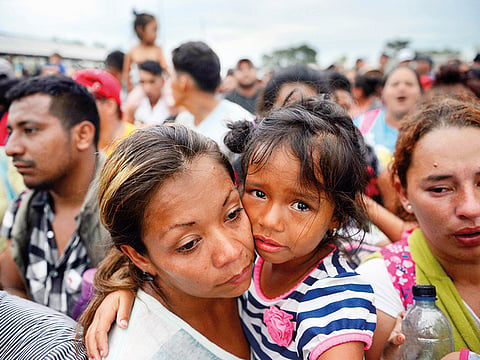Migrant caravan could prompt a wider confrontation between Mexico, US
Trump threatens to cut Central America aid over migrant caravan

TAPACHULA, Mexico: As thousands of Central American migrants continue their long walk to the US border, prompting daily condemnations from President Donald Trump, the Mexican government has had to decide: Are Trump’s threats enough to prompt an intervention?
For now, Mexican police have merely stepped aside as the caravan has passed, watching first as migrants took rafts across the river that separates the country from Guatemala, and then as they continued by foot along the main highway, chanting, “Si, se pudo,” or “Yes, we did it.”
"Sadly, it looks like Mexico’s Police and Military are unable to stop the Caravan heading to the Southern Border of the United States."
That response appears to have been conveyed to the White House, and again, Mexico’s most important bilateral relationship appears to be on shaky ground. “Sadly, it looks like Mexico’s Police and Military are unable to stop the Caravan heading to the Southern Border of the United States,” Trump tweeted.
He later said on Fox News, “I don’t know what’s going on with Mexico. It looks like the people are walking right through the middle of Mexico. So I’m not exactly thrilled there either!” Trump also vowed to begin curtailing millions of dollars in US aid to three Central American nations of Guatemala, Honduras and El Salvador and called the caravan a national emergency, as he sought to boost his party’s chances in November 6 congressional elections. “Guatemala, Honduras and El Salvador were not able to do the job of stopping people from leaving their country and coming illegally to the US. We will now begin cutting off, or substantially reducing, the massive foreign aid routinely given to them,” Trump wrote in a series of Twitter posts.
Speaking to reporters, Trump stepped up his criticism, saying that despite getting a “tremendous amount of money” in US foreign aid, Guatemala, Honduras and El Salvador “like a lot of others, do nothing for our country.” Trump also said, without providing evidence, that “Criminals and unknown Middle Easterners” are mixed in with the caravan, a claim immigration advocates disputed.
The caravan has marked another chapter in Mexico’s complicated effort to balance American threats with the country’s own domestic politics. Detaining or deporting the caravan’s members would certainly please Trump, but it would flout the country’s own immigration laws and further the impression that the Mexican government is taking orders from a hostile White House.
So far, the Mexican police appear to be conscious of that tension, and the optics of their presence. Riot police have stopped to pose for pictures in their gear, as if ready to combat the migrants, letting international television crews film them before retreating.
The caravan risks a wider confrontation with Washington if Trump threatens to cut off aid to Mexico, as he has threatened Central America, or attempts to seal the border with the US military. Every day, billions of dollars of trade crosses the US-Mexico border, and any attempt to block those flows could inflict serious economic harm on Mexico. The newly renegotiated North American trade agreement is also hanging in the balance as it has yet to be ratified by legislatures.
The dilemma for the Mexican government is worsened by the fact that the incoming government of Andres Manuel Lopez Obrador has campaigned on a gentler approach to migration, saying it would not hunt down migrants as if they were criminals.
“You have Trump’s government pressing Pena Nieto’s government to deter or stop the flows, but on the other hand, you have the pressure of public opinion and the new government saying you should treat the newcomers with dignity,” said Daniel Millan, a former spokesman in President Enrique Pena Nieto’s government who is now a political consultant. “They are walking a tightrope.”
Mexico’s incoming foreign minister, Marcelo Ebrard, said Monday on Mexican radio that it would be a “big mistake” for the Mexican government to use its own armed forces to try to stop the caravan. “It would be inadmissible in Mexico to use the army against these people,” he said, adding that he didn’t think Pena Nieto’s government was considering that step. “We would not be in agreement with that at all.”
After a meeting with Canadian Foreign Minister Chrystia Freeland in Ottawa on Monday, he added that his administration would offer more work visas for Central Americans. “We are going to invest in Honduras, Guatemala and El Salvador,” he said.
—Washington Post



